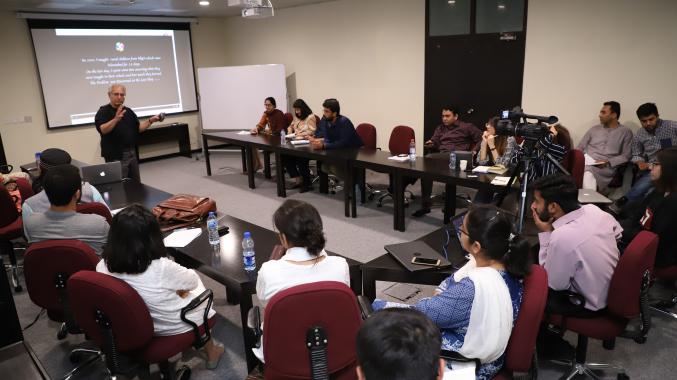
On Friday, April 26, SOE invited Shad Moarif as a guest speaker to share his body of work with the SOE audience. The topic presented was ‘Past Practices and Current Needs of Teachers and Learners of Mathematics: The Great Divide.’ The talk was moderated by MPhil ELM student, Sumaiya Zafar Faridi, and was attended by SOE MPhil and SBASSE faculty and students.
Shad Moarif, EdM, the designer and developer of the Karismath program is an Aga Khan Foundation Scholar and Harvard graduate (Psychology) who studied under Dr. Jeanne Chall (once Advisor to the White House on Reading) and Dr. David Rose who founded the Universal Design in Learning movement. Mr. Moarif was the Vice-President of the International Dyslexia Association (IDA), Canada where he subsequently served as a consultant on the Governing Board. He has spoken at numerous conferences and workshops on Math Education in Canada, USA, Singapore, UK (Lead Speaker on Dyscalculia Conference); Pakistan (Keynote for READ, Karachi); Kenya (Training Workshop: Aga Khan Foundation International School Faculty), and Bangladesh. Shad introduced the understanding, diagnosis and remediation of Dyslexia in Pakistan. The first remedial centre R.E.A.D (Remedial Education, Assessment & Diagnosis) for Language Learning Difficulties was established by him in Pakistan in 1986.
The discussion at SOE was built around the way Mathematics is taught in classrooms reflects how society and culture moulds attitudes towards schools and education in general. Throughout the session, the speaker posted open ended questions to generate discussion. Mr. Moarif initiated the session with a video that helped the audience to understand specific challenges faced by teachers and students in numeracy in low cost schools. The session gained momentum when Mr. Moarif explained how visual representations integrated in Mathematics curriculum makes it easier for students to grasp the concepts irrespective of their social and cultural backgrounds.
He highlighted the issue of divide over rules and reason. Elaborating on the problem, he said that there are many ways this divide is manifested. Rote learning of rules in Mathematics leads to a situation where there is no understanding behind the rationale. The divide is also about how rule-oriented learning of Mathematics, if done right, generates academic achievement without triggering the kind of active curiosity an inquiring mind needs to pursue university education. Lastly the divide also reflects generational changes in the learner’s mind-set. Their experiences with immersive technology is inducing cognitive gratification at deeper levels. This conflicts with conventional ways of teaching that do not correspond with how their minds learn.
The session witnessed a rich exchange of ideas in the Question and Answer session, where several problems were discussed. Dr. Tayyaba Tamim talked about the language barrier that the students have to face, as they first have to process the information from English to their native language, which makes the learning process significantly slower. The classroom culture was also discussed as to how the expectation from the students to not question the teacher kills the curiosity and confidence in the students.
The talk also created exciting opportunities for MPhil students, Mahnum Humayun, Haris Abdul Hamid, and Fatima Khan explored future connections by getting involved in Shad Moarif's Karismath Programme. Karismath is an interface which mediates between Mathematics and the learner by using imageries but no numbers so that learners move to an abstract level of thinking. It makes math concepts visible, accessible and usable. Learners go beyond the numerical surface of numbers and explore visual constructs of concepts with their minds. The use of visual scaffolding traces this natural path of learning.








